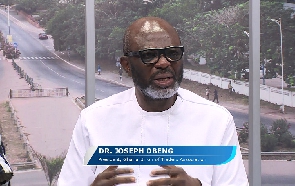Opinions of Saturday, 29 July 2006
Columnist: Owusu, Robert Yaw
A View on The Call for Amendment of Article 78 of Ghana’s 1992 Republican Constitution
I would like to write in support of the call for amendment of Article 78 of the 1992 Constitution of the Republic of Ghana. As Hon. Eddie Blay argued and supported by others the proposed amendment is utterly necessary for the following reasons.
First, good governance requires checks and balances which can be achieved by internal mechanism established to do exactly that. Hence, the notion of the “separation of powers” is well formulated in the relationships of the president and his helpers (cabinet and ministers of state) as executive, the legislature (parliament) as law makers, and the judiciary as the auditors of the process of democracy (or the kind of political system in operation). A good system of governance provides specificities and limitations of these three powers of government. The independence of each of these three powers is absolutely essential and, other things being equal, each of the three branches is as powerful as the others. They are co-equals. Therefore, the independence and the legitimate powers invested in these organs of government must be protected and utilized effectively and efficiently?
Article 78 of the 1992 constitution, in my view, empowers the executive to co-opt the legislative branch and by so doing and unintentionally weakens the powers of the latter and undermines its independence. As it is now, a part of the legislature has become clients of the executive. Consider this scenario – (Scene 1): you see a member of parliament who introduces a bill in the House (a bill which perhaps was initiated by the president), the minister cum parliamentarian votes for the bill and the president signs it into law; (Scene 2): you see the same person empowered to enforce the said law as a member of the executive; then at another stage (Scene 3), you see the same person empowered to sit as a member of the oversight committee of the legislative house to supervise his or her own action. This scenario may not have happened yet, but it can. Is this not a serious conflict of interest at this time of Ghana’s democratic dispensation? We all know the problem of clientelism and patronage in our society. In reality, the allegiance of the parliamentarian-minister/deputy minister of state will be to the president/the executive, especially if “loyalty” to the president/executive is the preferred norm to national interest. Second, there is the problem of the public image of the non-minister-parliamentarian or a minister who loses his or her ministerial status and becomes an “ordinary parliamentarian.” Members of the House particularly those in the ruling party that do not obtain ministerial office may appear inadequate or ineffective in the eyes of their constituents. In some case they may be regarded as “losers” for the fact that they couldn’t catch the eyes of the “big man” (the president) and so he/she may not be able to deliver—bring the so called goodies or development projects to their constituencies. The same problem places an unwarranted burden on the president as well. How will a section of the party’s faithful feel if the president does not give ministerial position to Honourable so and so who worked so hard for the party’s election victory?
Also, some people may stand for parliamentary election for the sole purpose of getting ministerial appointments. The constitution allows the appointment of non-parliamentarians as ministers or deputy ministers of state but it also states that “the majority of Ministers of State shall be appointed from among members of Parliament.” The same goes for the deputy minister according to Section 2 of Article 79. But it must be emphasized that parliament and its function—to do the people’s business as a law making body and to provide oversight on the executive branch—must be the sole motivation for parliamentary elections. It may also happen as it is in our society that members of the House who lose their ministerial portfolio become “discredited” in one way or another and thus affect their performance in the House. In some instances, too, the president /executive may be blamed for such a change even though the change is made on the sole purpose of national interest. It may be also true that the president/executive may use that power to restructure and to appoint ministers from the House as a tool to punish some parliamentarian-ministers/deputy ministers for some other reasons. In such a situation that action of the executive goes to undermine the powers and independence of the House. Finally, there is the problem about the diminishing of the parliamentary business. Parliament is as important as the executive and that it should strive not to become the rubber stamp of the executive. One way to avoid that is to amend article 78 of the constitution so that the ministers of state and their deputies can be chosen outside the parliament. Any parliamentarian who is chosen or accepts ministerial office must resign from the House and a new election held to replace him/her. Every constituency must be adequately and effectively represented in the House to do the people’s business. Parliament needs its full House to do its business. This is not the case in the national assembly where, with the continual increasing of ministers of state and their deputies, the House is sometimes virtually empty because of the absence of ministers-of state, who will be rightly doing their ministerial or executing business. The constitution mandates the president to “appoint such number of Ministers of State as may be necessary for the efficient running of the State” which any unscrupulous president can use to cripple the House if he/she so desires. Thus one branch of government becomes conspicuously busy at the expense of the other. Moreover, the responsibilities of the parliamentarian cum minister of state become burdensome and may lead to incompetence and failure. And who do we blame?
In closing, the business of parliament is so important and intellectually demanding that it must be accorded the attention and the kind of human resources (i.e., the personnel) it requires to function appropriately. The integrity of this co-branch of government must be safeguarded. The proposed amendment will certainly do that. Moreover, every Ghanaian citizen must be aware that he/she can be the next member of the house or the next minister/deputy minister of state and must therefore seek to make himself or herself electable to parliament for our constitution states in the Article 78 that to qualify for such an office they must be “persons qualified to be elected as members of Parliament.” It means that one does not need to be elected to parliament in order to serve as a minister of state. The one, however, must meet the honourable standard required of members of parliament. The quality of the Ghanaian citizenry is the key and how, as a nation, are we preparing our citizens to become electable in preference to the recycling of our Honourable politicians? The proposed amendment is indeed necessary and must be given urgent consideration.













